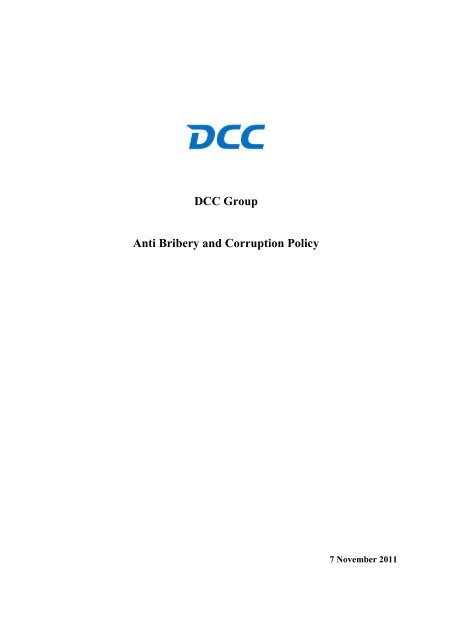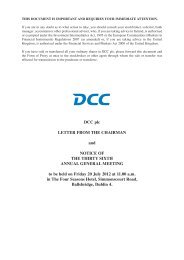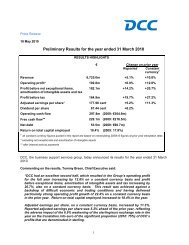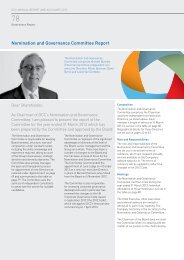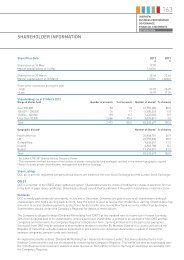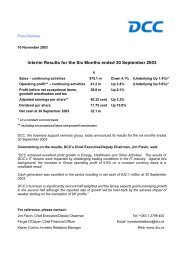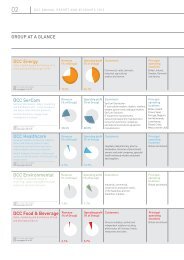DCC Group Anti Bribery and Corruption Policy - DCC plc
DCC Group Anti Bribery and Corruption Policy - DCC plc
DCC Group Anti Bribery and Corruption Policy - DCC plc
You also want an ePaper? Increase the reach of your titles
YUMPU automatically turns print PDFs into web optimized ePapers that Google loves.
<strong>DCC</strong> <strong>Group</strong><br />
<strong>Anti</strong> <strong>Bribery</strong> <strong>and</strong> <strong>Corruption</strong> <strong>Policy</strong><br />
7 November 2011
<strong>DCC</strong> <strong>Group</strong><br />
<strong>Anti</strong> <strong>Bribery</strong> <strong>and</strong> <strong>Corruption</strong> <strong>Policy</strong><br />
Introduction <strong>and</strong> Key <strong>Policy</strong> Statements<br />
This <strong>Anti</strong> <strong>Bribery</strong> <strong>and</strong> <strong>Corruption</strong> <strong>Policy</strong> covers <strong>DCC</strong> <strong>plc</strong> <strong>and</strong> all of its subsidiaries, operating<br />
<strong>and</strong> legal entities <strong>and</strong> employees.<br />
<strong>DCC</strong> <strong>plc</strong> is committed to conducting its business in an open, honest <strong>and</strong> ethical manner <strong>and</strong><br />
the Board of <strong>DCC</strong> <strong>plc</strong>, the Chief Executive of <strong>DCC</strong> <strong>plc</strong>, senior management <strong>and</strong> all<br />
subsidiaries of the <strong>DCC</strong> <strong>Group</strong> have a zero risk appetite for <strong>and</strong> a zero tolerance approach to<br />
all forms of bribery <strong>and</strong> corruption. There are no policy waivers or exceptions.<br />
Part of our commitment to our values is to adhere strictly to relevant laws in relation to<br />
bribery <strong>and</strong> corruption including the Prevention of <strong>Corruption</strong> Acts 1889 – 2010 <strong>and</strong> the<br />
Criminal Justice (Theft <strong>and</strong> Fraud Offences) Act 2001 in Irel<strong>and</strong> <strong>and</strong> the <strong>Bribery</strong> Act 2010 in<br />
the UK, where they are relevant to our operations <strong>and</strong>/or where they set the st<strong>and</strong>ards that we<br />
consider it is imperative for <strong>DCC</strong> to follow.<br />
This policy sets out the st<strong>and</strong>ards expected of all <strong>DCC</strong> employees in relation to bribery <strong>and</strong><br />
corruption. This policy is also relevant for third parties who perform services for or on behalf<br />
of <strong>DCC</strong> <strong>and</strong> its <strong>Group</strong> companies. <strong>DCC</strong> expects those employees <strong>and</strong> third parties to abide<br />
by this policy, or have in place equivalent policies <strong>and</strong> procedures to combat bribery <strong>and</strong><br />
corruption, <strong>and</strong> to comply without exception with all relevant laws relating to bribery <strong>and</strong><br />
corruption wherever <strong>DCC</strong> operates. <strong>DCC</strong> is aware of the serious risks that non-compliance<br />
brings should employees or service providers fail to comply.<br />
<strong>DCC</strong> aims at all times to have suitable <strong>and</strong> proportionate structures <strong>and</strong> processes in place to<br />
identify <strong>and</strong> manage risks, to ensure that any breaches are appropriately <strong>and</strong> proportionately<br />
escalated in a timely fashion.<br />
This policy <strong>and</strong> the effectiveness of the structures <strong>and</strong> processes for implementation <strong>and</strong><br />
oversight are reviewed annually by the Board.<br />
This policy should be read in conjunction with the more detailed policies which are in place<br />
in <strong>Group</strong> companies <strong>and</strong> the Guidance Note on the <strong>Bribery</strong> Act 2010, which is appended to<br />
those policies.<br />
<strong>Bribery</strong><br />
<strong>Bribery</strong> is a criminal offence in all countries in which the <strong>Group</strong> operates.<br />
In the UK, the <strong>Bribery</strong> Act 2010 modernises the law on bribery <strong>and</strong> introduces a new<br />
corporate offence of failing to prevent bribery by a commercial organisation.<br />
In the context of the <strong>Bribery</strong> Act 2010, a bribe is any financial or other advantage which is<br />
offered, promised or given by one person to another, where the intention is to induce or<br />
reward improper performance of a public function, or business activity, or is done in the<br />
1
knowledge or belief that acceptance of the advantage itself constitutes the improper<br />
performance of a public function, or business activity.<br />
A bribe does not need to be a monetary sum. A bribe can be any type of gift, consideration or<br />
advantage offered or requested, for example, an award of a contract, a discount in a<br />
commercial transaction or an offer of employment.<br />
A contract or transaction does not need to have been won or completed for a corruption<br />
offence to have been committed. Similarly, a recipient does not need to benefit personally<br />
from a bribe – it may be the intended beneficiary is a third party or a company. Finally,<br />
bribery can occur in the private as well as the public sector.<br />
<strong>DCC</strong>'s policy incorporates two straightforward rules that all employees must adhere strictly<br />
to:<br />
<strong>Corruption</strong><br />
Do not offer, promise or pay bribes<br />
Do not request, agree to or accept bribes<br />
<strong>Corruption</strong> is an abuse of a position of trust in order to gain an undue advantage.<br />
The risks of corruption are not always obvious. Accordingly, employees should follow these<br />
principles:<br />
Do not make payments to someone (or favour them in any other way) if you know<br />
that this will involve someone in misuse of their position (or them performing their<br />
functions improperly).<br />
Do not misuse your position (or perform your functions improperly) in connection<br />
with payments (or other favours) for yourself or others.<br />
Do not deliberately use advantages to try to influence foreign public officials for<br />
business reasons. If you need to promote <strong>DCC</strong>'s business with a foreign public<br />
official, always check in advance with your company’s managing director.<br />
Facilitation Payments<br />
Facilitation payments are typically small payments paid to speed up an administrative process<br />
or secure a routine government action by an official <strong>and</strong> are most frequently encountered in<br />
foreign jurisdictions with perceived high corruption risks.<br />
Facilitation payments are bribes <strong>and</strong> prohibited by this policy.<br />
Facilitation payments should be contrasted with official, lawful payments (typically to an<br />
organisation rather than an individual) to expedite certain functions (e.g. where there is a<br />
choice of fast track services to obtain a passport).<br />
2
<strong>DCC</strong>'s policy strictly prohibits any kind of facilitation payments made by employees, agents<br />
or third parties acting on its behalf.<br />
If you are unsure as to the validity of an official's request for a payment, the steps below<br />
should be followed as far as they are applicable <strong>and</strong> as far as it is possible for you to do so<br />
without putting your personal safety or security at risk:<br />
if possible contact your company’s managing director immediately<br />
ask the official for proof of the validity of the payment<br />
request that a receipt be provided confirming the validity of the payment<br />
if no proof of validity will be provided, politely decline to make the payment <strong>and</strong><br />
explain you cannot make the payment because of company policy <strong>and</strong> anti-bribery<br />
laws<br />
if possible ask to see the official's supervisor<br />
make a full note of the request, the circumstances <strong>and</strong> the parties involved<br />
at all times remain calm, respectful <strong>and</strong> polite<br />
If you find you are in fear for your safety or at risk of loss of liberty, do not refuse the<br />
payment. In all circumstances, report any dem<strong>and</strong> for facilitation payments to your<br />
company’s managing director.<br />
Gifts <strong>and</strong> Hospitality<br />
This policy is not meant to prohibit the giving or receiving of reasonable <strong>and</strong> proportionate<br />
gifts <strong>and</strong> hospitality, subject to the following rules:<br />
They are appropriate in all the circumstances <strong>and</strong> there is no risk or perception that<br />
they might improperly influence the recipient.<br />
They do not contravene any rules applying to the individual to whom the hospitality<br />
or gift is offered (i.e. any policy that another organisation has in place) or any laws<br />
applying to that other person (whether in Irel<strong>and</strong>, the UK or elsewhere).<br />
The expenditure in question is not related in time to some actual or anticipated<br />
business with the recipient, particularly in a competitive context.<br />
In the case of hospitality provided or received, it is intended to foster cordial relations<br />
or has legitimate marketing purposes <strong>and</strong>:<br />
o The level of hospitality is appropriate with regard to the recipient <strong>and</strong> their<br />
organisation.<br />
o There are no "add-ons" such as inappropriate overnight accommodation, travel<br />
costs, or sundry or lavish expenses.<br />
In the case of gifts, these should never be cash <strong>and</strong> must be modest at all times, such<br />
as a token of appreciation on a festival or at another special time such as the<br />
completion of a project with a customer/supplier, <strong>and</strong> where there is no risk of them<br />
being misconstrued as a reward, an inducement or other corrupt act.<br />
In the case of any gift or hospitality to be provided to a public official, this must also<br />
be approved in advance by your company’s managing director.<br />
The expenditure (whether given or received) is in compliance with the limits <strong>and</strong> the<br />
approval processes set out in the detailed policies in place in all <strong>Group</strong> companies.<br />
All offers of hospitality <strong>and</strong> gifts given or received above an appropriate level, as<br />
approved by your company’s managing director <strong>and</strong> divisional managing director,<br />
must be recorded, as required, in a Gifts <strong>and</strong> Hospitality Register.<br />
3
Sponsorship, Charitable <strong>and</strong> Political Donations<br />
All sponsorship <strong>and</strong> charitable donations made on behalf of a <strong>Group</strong> company must be<br />
approved in advance by the company’s managing director. Any political donation must be<br />
approved in advance by the relevant divisional managing director, who will consult with the<br />
<strong>DCC</strong> <strong>plc</strong> Compliance Officer.<br />
Responsibilities<br />
The Board of <strong>DCC</strong> <strong>plc</strong>:<br />
Has overall responsibility for ensuring this policy complies with <strong>DCC</strong>'s legal obligations<br />
(whether in Irel<strong>and</strong>, the UK, or elsewhere).<br />
Approves risk appetite <strong>and</strong> tolerance.<br />
Approves the policy statement.<br />
Oversees the implementation of the policy.<br />
The Risk Committee of <strong>DCC</strong> <strong>plc</strong>:<br />
Reviews the policy <strong>and</strong> compliance structures on an annual basis <strong>and</strong> reports the results of<br />
this review to the Board.<br />
Reviews application of the policy <strong>and</strong> of significant issues escalated.<br />
The <strong>DCC</strong> <strong>plc</strong> Compliance Officer / Head of <strong>Group</strong> Compliance:<br />
Has primary responsibility for monitoring the effectiveness of the policy.<br />
Carries out a comprehensive annual risk management assessment specifically relating to<br />
bribery <strong>and</strong> corruption issues.<br />
Has ownership of implementation structures for policy, compliance <strong>and</strong> of escalation<br />
processes.<br />
Is the ultimate point to which specific issues are escalated <strong>and</strong> has ownership of how<br />
issues escalated are dealt with.<br />
Ensures that throughout the business evidence is retained to demonstrate <strong>Bribery</strong> Act <strong>and</strong><br />
other legislative <strong>and</strong> regulatory obligations.<br />
Has ownership of benchmarking <strong>DCC</strong> to relevant industry best practice.<br />
<strong>Group</strong> Internal Audit:<br />
Assesses independently policy implementation <strong>and</strong> operational effectiveness.<br />
Subsidiary management:<br />
Is the first line responsibility for compliance with policy.<br />
The boards of <strong>Group</strong> companies are responsible for ensuring that their employees comply<br />
with this policy <strong>and</strong> with the more detailed policies in place in all subsidiaries <strong>and</strong> that<br />
third parties who perform services for or on their behalf abide by these policies <strong>and</strong> with<br />
any equivalent policies <strong>and</strong> procedures that they may have in place.<br />
Management at all levels in all <strong>Group</strong> companies are responsible for ensuring those<br />
reporting to them are made aware of <strong>and</strong> underst<strong>and</strong> this policy <strong>and</strong> are given adequate<br />
<strong>and</strong> regular training on it.<br />
4
Employees:<br />
Must read, underst<strong>and</strong> <strong>and</strong> comply with this policy.<br />
Seeking Further Guidance<br />
If in doubt, employees should always seek further guidance about a proposed arrangement or<br />
relationship before taking any steps in relation to it.<br />
Breaches of <strong>Policy</strong><br />
<strong>DCC</strong> <strong>plc</strong> <strong>and</strong>/or the relevant <strong>Group</strong> company will take action against any individuals or other<br />
parties that it discovers are involved in bribery or any other form of corruption. Breaches of<br />
this policy will lead to disciplinary action against employees, which could result in dismissal<br />
for gross misconduct.<br />
Failure by any employee to report corrupt activity by other persons can also result in<br />
disciplinary sanctions, especially where there is evidence that an employee has attempted to<br />
cover up or disguise another's wrongdoing.<br />
Raising a Concern<br />
Any employee who has a concern in regard to this policy should, in the first instance, report<br />
the concern to their direct line manager/director or managing director. If, for whatever<br />
reason, employees feel that they cannot speak with any of these about their concern or if they<br />
think the concern has not been h<strong>and</strong>led properly, then they should follow the procedures set<br />
out in the <strong>Group</strong> Whistleblowing <strong>Policy</strong> <strong>and</strong> contact Gerard Whyte, <strong>DCC</strong> <strong>plc</strong> Compliance<br />
Officer, <strong>DCC</strong> <strong>plc</strong>, at <strong>DCC</strong> House, Brewery Road, Stillorgan, Co. Dublin, Irel<strong>and</strong> or call him<br />
on + 353 1 2799497 (dedicated number) or email him at gwhyte@dcc.ie.<br />
<strong>DCC</strong> <strong>plc</strong> is committed to ensuring that any concerns are investigated appropriately <strong>and</strong> that<br />
any employee who raises a concern in good faith shall suffer no detriment or disadvantage for<br />
doing so – including where a concern may prove later to be unfounded.<br />
Record Keeping<br />
<strong>DCC</strong> <strong>plc</strong> <strong>and</strong> its <strong>Group</strong> companies must keep accurate financial <strong>and</strong> other records <strong>and</strong> have<br />
appropriate internal controls in place which evidence the business reasons for making<br />
payments to any third parties (such as anyone who provides services for or on behalf of<br />
<strong>DCC</strong>).<br />
5


